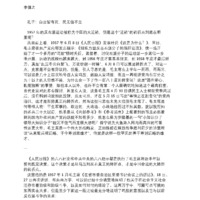Li Shenzhi (August 15, 1923 - April 22, 2003) was a sociologist, media professional, and expert on international issues. From 1941 to 1945, Li studied at the Economics Department of Yenching University in Beijing, the Economics Department of St. John's University, and Yenching University in Chengdu, during which time he participated in a CCP secret organization. After graduation, he worked as a middle school teacher and magazine editor. In 1946, Li joined the *Xinhua Daily*, and later became an editor of the International Department of Xinhua News Agency. He joined CCP in November 1948, and became the head of the editorial team and deputy director of the International Department of Xinhua News Agency in 1949. From 1954 to 1957, he was the diplomatic secretary of then foreign minister Zhou Enlai. During the Anti-Rightist Campaign and the Cultural Revolution, Li was persecuted for advocating press freedom and democracy.
After being rehabilitated, Li returned to Beijing in 1973, where he worked for the International Issues Writing Group set up by CCP’s Central Committee. He accompanied then paramount leader Deng Xiaoping on his trip to the U.S. as an advisor in 1979, and later accompanied then premier Zhao Ziyang on his trip to the U.S. as an assistant in 1984. He was in charge of the establishment of the Institute of American Studies at the Chinese Academy of Social Sciences in 1980, served as director of the Institute from 1982 to 1988, and vice-president of the Academy from 1985 onwards. After the 1989 democracy movement, Li was disciplined for supporting the students, and he then resigned from his position. Li later dedicated himself to promoting liberalism, democracy and rule of law in China.
On April 22, 2003, Li died in Beijing due to illness.
After being rehabilitated, Li returned to Beijing in 1973, where he worked for the International Issues Writing Group set up by CCP’s Central Committee. He accompanied then paramount leader Deng Xiaoping on his trip to the U.S. as an advisor in 1979, and later accompanied then premier Zhao Ziyang on his trip to the U.S. as an assistant in 1984. He was in charge of the establishment of the Institute of American Studies at the Chinese Academy of Social Sciences in 1980, served as director of the Institute from 1982 to 1988, and vice-president of the Academy from 1985 onwards. After the 1989 democracy movement, Li was disciplined for supporting the students, and he then resigned from his position. Li later dedicated himself to promoting liberalism, democracy and rule of law in China.
On April 22, 2003, Li died in Beijing due to illness.
